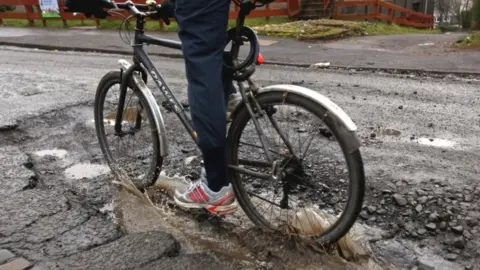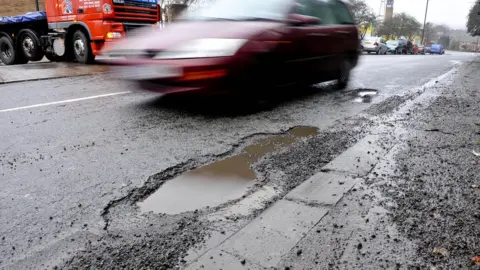Paralympian's pothole injury as thousands claim compensation
 Stephen Thomas
Stephen ThomasA Paralympian thrown from his bike when he cycled over a pothole has said his helmet saved his life.
Stephen Thomas said it was lucky it was not a child who hit the submerged hole in Barry, Vale of Glamorgan.
He spoke as figures show more than 5,000 compensation claims have been made by people hitting potholes in Wales in the past four years.
The Welsh Local Government Association (WLGA), which represents councils, said more cash was needed to fix them.
Figures obtained by BBC Wales reveal that since 2014, 5,308 claims have been made to Welsh councils - excluding Monmouthshire which did not respond - by road users who say either they were injured or their vehicle damaged by a pothole.
Of these, 933 claims were successful and just over £1m in compensation was paid out.
But the figures also showed the amount of compensation paid out has been consistently falling year on year, from £590,000 in 2014/15 to £45,000 in 2017/18.
 Getty Images
Getty ImagesThis is despite fluctuations in the number of successful claims, from 279 in 2014/15 to 333 in 2015/16, and from 167 in 2016/17 to 154 in 2017/18.
Paralympic sailor Mr Thomas hit a "four-inch" pothole which was hidden by a puddle while out cycling near his home in Barry.
"The front wheel stopped immediately and then I was hurled off my bike on to the floor, face first," said Mr Thomas.
"I got lucky as the helmet saved me, but if a child had been cycling through the park that day then who knows what could have happened."
The AA said it had seen almost three times as many pothole-related car insurance claims this year.
 PA
PAJohn Coles, a mechanic from Cardiff, said pothole-related car damage was becoming more frequent.
"There has definitely been an increase in damage to springs, bushes and ball joints," he said.
"They are horrendous. We need investment."
Figures from the Asphalt Industry Alliance (AIA) show that on average, 32% of Welsh councils' road maintenance budgets were spent on reactive maintenance last year - the ideal proportion is 11%, the AIA said.
The AIA added it would cost each Welsh local authority an average of £27.4m to bring its roads back into a "reasonable condition".
The RAC said the disparity between compensation paid and claims received could be "read in different ways".
Councils have a statutory defence if they do not know the pothole exists, explained RAC spokesman Simon Williams.
He said it could be because councils were either simply rejecting claims, or the potholes were not being found because fewer inspections were taking place.
And the AA said it was "rescuing record numbers" of drivers whose vehicles were damaged by potholes.
"The lack of proper investment means that highway authorities are doing little more than papering over the cracks," said Edmund King, AA president.
The WLGA defended councils and suggested the drop in compensation paid out was because monitoring methods had improved.
The main problem was underfunding and the WLGA supported a campaign calling for the ring-fencing of two pence per litre from fuel duty to improve roads, a spokesperson said.
